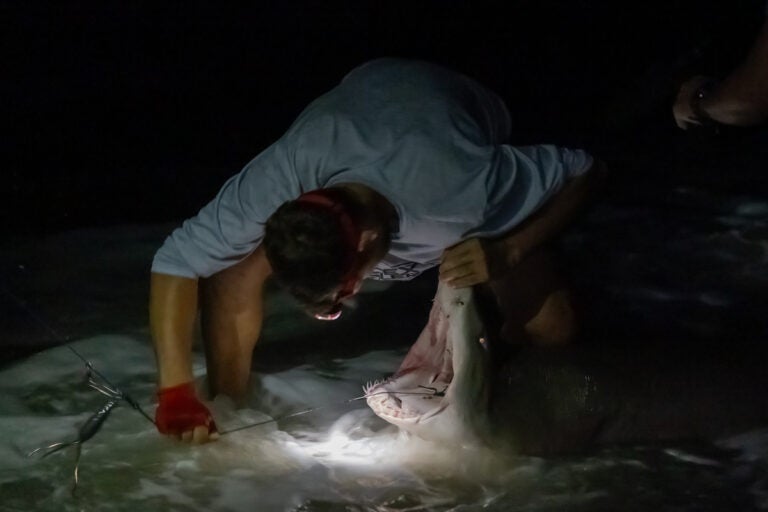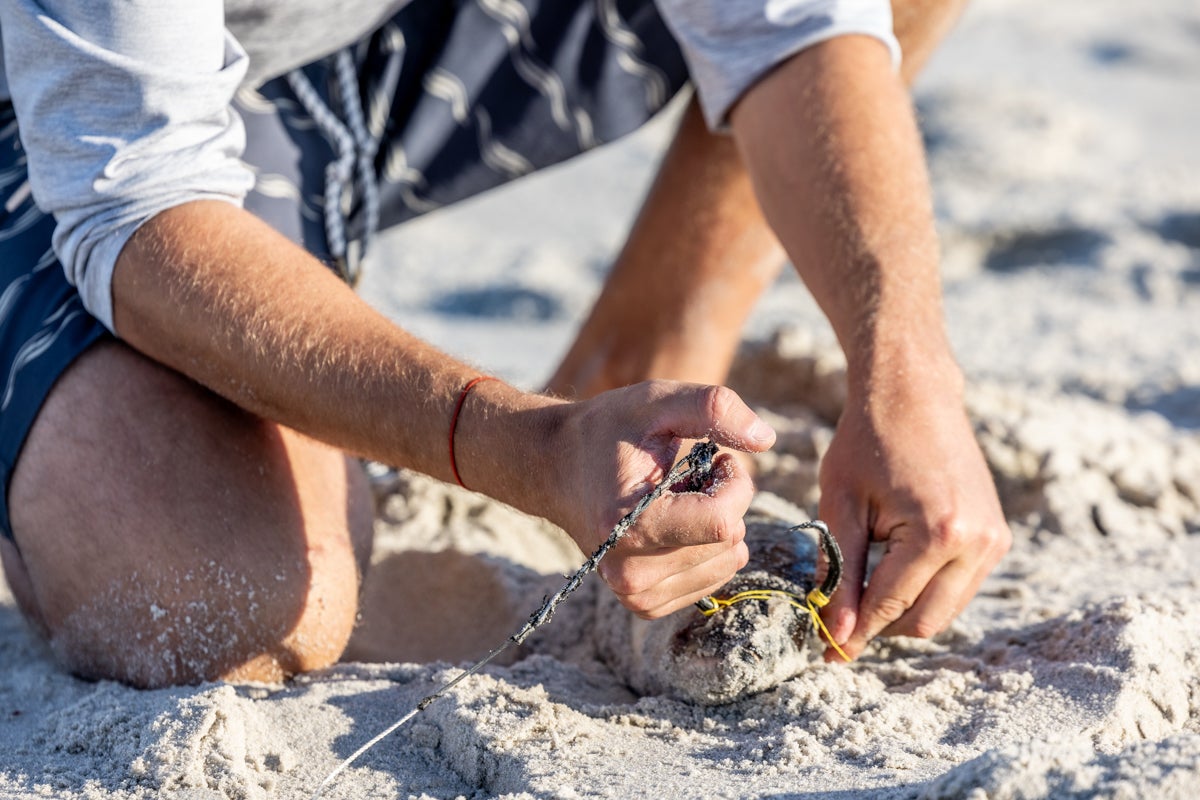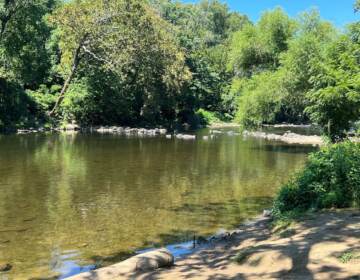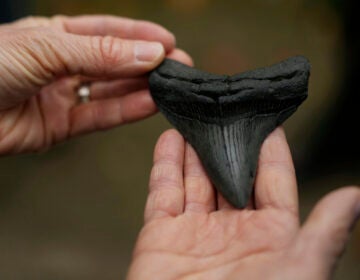Meet a shark fisherman who structured his life around catching, and saving, sharks
13 years ago, AJ Rotondella realized he could catch sharks from the beach. He’s been hooked ever since, even moving across states to chase sharks.
Listen 12:02
AJ Rotondella removes the hook from the mouth of a sand tiger shark after helping clients catch the fish on a N.J. beach. (Kimberly Paynter/WHYY)
This story is from The Pulse, a weekly health and science podcast.
Find it on Apple Podcasts, Spotify, or wherever you get your podcasts.
At an undisclosed beach at 5:30 p.m. in New Jersey, shark fisherman AJ Rotondella and two clients wait for beachgoers to leave. Once the beach is empty, Rotondella cuts up some chunks of fish as bait, and casts lines into the water.
“I shark fish, shark fish, shark fish, eat pizza, and shark fish … that’s pretty much it,” Rotondella said. “Waking up in the morning … wide open ocean, anything could be anywhere at any time. And I think that’s fascinating. No matter how long you’ve done this, you’ve never seen it all.”
Shark fishing at the Jersey Shore from WHYY News on Vimeo.
He has always loved fishing, and got into shark fishing 13 years ago, when his brother told him they could catch sharks from the beach. They caught two on their first day and could not catch another shark for the rest of the year.
“That really got me interested because I knew it was possible, but I couldn’t do it again,” he said. “I … absolutely obsessed over this.”
But Rotondella had a steep learning curve ahead of him. By trial and error, sometimes staying on a beach for multiple days, he learned how to read the tides, water temperatures, currents, and even phases of the moon to figure out how to track the sharks.

“That’s just through sheer torture. It was horrible. But looking back, obviously it’s rewarding, because now I can just pick and choose the window that I know is gonna produce, catch a bunch, and go home, instead of having to sit out there for 60 hours and hope for a bite.”
He prefers shark fishing from the beach because it’s a challenge, even though there are bigger and faster fish, like tuna, that he could catch from a boat.
“It’s not as magical. I’m sure there are fish you can pursue that is definitely rewarding, but to catch a fish with your feet on the sand without being able to chase them down … I find that to be a lot more fun,” he said. “Also, when you catch a huge animal like a shark, you get right up next to it, instead of … looking over the boat.”
Rotondella was born and raised in N.J. but moved to Florida so he could catch sharks year-round. Now he spends the summers down the Jersey Shore and the winters in Florida. He runs the company Apex Anglers, where he guides people who want to catch sharks.
The thrill of the catch
Rotondella flies a drone over the water to drop some bait off further than he could cast a line.
When the lines shake, showing that something is eating the bait, Rotondella sprints to the line to reel in whatever is on the other end.
Over the course of a few hours, this happens three times, but still no shark.
He puts in bigger bait, going from fish chunks to half a fish to a whole fish.
After 10 p.m., with the light of head lamps and buildings behind us, the lines shake once again. Rotondella reels the line in.
This time the shark is hooked. He hands the line to his client, who keeps reeling, fast.
Then, Rotondella, the client, and I walk towards the water, stopping where the water covers our feet.
We see a 7-foot-long sand tiger shark on the other end of the line. It’s grey on top, with a white belly. The hook is in its mouth, and it wriggles in the water.
Subscribe to The Pulse
Rotondella makes sure the shark is submerged so it always has water to breathe through.
He cuts the metal wire attached to the hook.
The client grabs the shark’s tail, spins it around so that it faces the ocean, and sets it free.
Rotondella warned me beforehand that we would barely see the sharks. That’s because he wants to fight them as little as possible before setting them free. He uses a barbless hook, so once he cuts the wire, the shark can just shake the hook off.
“You just want the fish to survive. That’s the end of the story. The point is for this to be a sustainable fishery, you need to have fish swimming off and living a happy life after the encounter.”
He said once he started catching sharks and being close to them, he appreciated them more.
The care that Rotondella takes with his catch is important, because many sharks are endangered, including the sand tiger.
From catch to conservation
John Mohan, a fish ecologist at the University of New England, said sharks get stressed from fighting an angler’s line. He has studied what helps sharks survive after being caught. He said sharks build up lactate from fighting a fishing line, just like humans do after sprinting very hard.
“You want to flush out that lactate and the only way to do that is to … get fresh water over the gills, which is going to help freshen up their blood essentially,” Mohan said.
Shark fishing has a history in the U.S. going back decades, but anglers being concerned with sharks surviving is a relatively new development.
Andy Danylchuk, professor of fish conservation at the University of Massachusetts Amherst, remembers going to the Florida Keys in the 1970s, seeing “massive tiger sharks, hammerheads all staked up … outside of this fishing pier.”
But research showed that shark populations are endangered, and shark anglers became more conservation minded. Danylchuk, who fishes for sharks himself, said what draws recreational shark anglers is not a kill; it’s “immersion in the environment … the thrill of the chase, the opportunity to get close to the thing that you’re targeting.”
The more he fished, the more he paid attention to their environment and realized the need for science to help protect them.
Now, Danylchuk studies the impact of recreational fishing, and works on recommendations for recreational anglers, while balancing the competing and overlapping interests of all the people who come into contact with sharks: anglers who fish for them, anglers who don’t want sharks to take their catch, and divers and snorkelers who want to see sharks.
“We’re doing a lot of science and social science and doing that in parallel because at the end of the day, we’re not managing sharks, we’re not managing fish — we’re managing people.”
WHYY is your source for fact-based, in-depth journalism and information. As a nonprofit organization, we rely on financial support from readers like you. Please give today.







